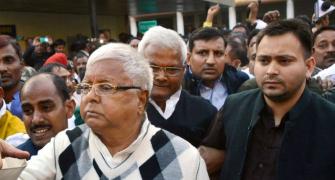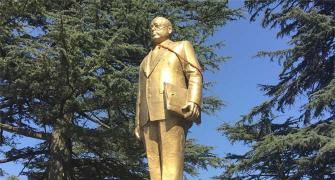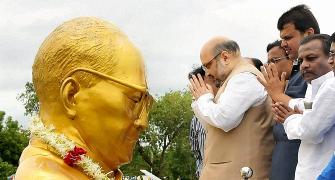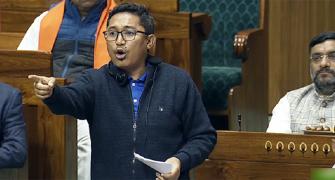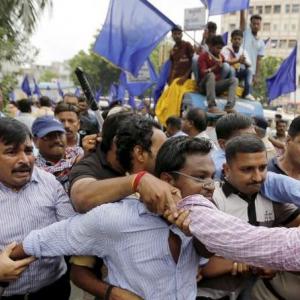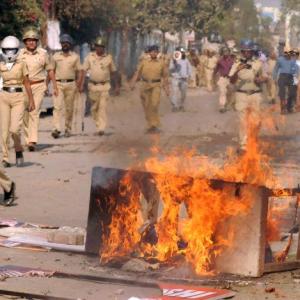Sukh Ram and Raja were charged with corruption during their tenure as telecom ministers.
Sukh Ram was convicted while Raja has been acquitted.
One had cash found under his bed; in the case of the other the trial judge mockingly asks: Where is the money? And if there's no money, where is the corruption? So, pronounced innocent.
Sukh Ram is a Brahmin. 'Maybe he strayed just that one time, people like that aren't usually corrupt.'
And Raja is a Dalit. 'Can you expect any better?'
What race is in some places, caste is in India, says Shekhar Gupta.
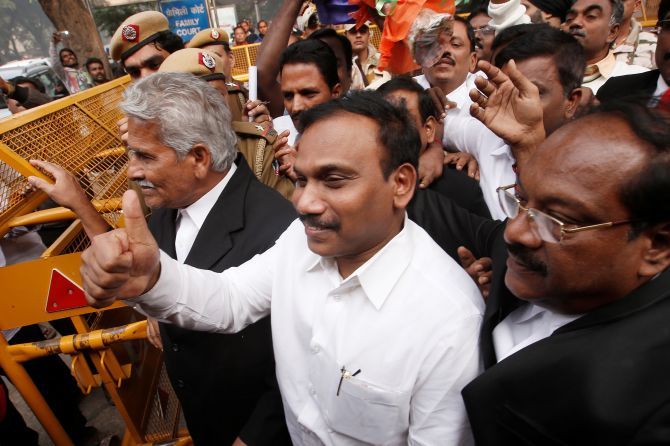
Is there a caste or communal link to corruption and crime?
Or, are your chances of being involved (and getting caught) in corruption cases higher as you go down the caste ladder?
Let's examine the facts.
Here is a roll call: A Raja, just acquitted after a six-year trial and 15 months in jail as an undertrial, is a Dalit.
His party colleague and now acquitted co-accused Kanimozhi is from a backward caste.
Madhu Koda (recently convicted in a coal case) and Shibu Soren (charged with bribery and murder and finally acquitted) are both tribals.
Mayawati, a Dalit, and Lalu Prasad and Mulayam Singh Yadav, OBCs, are caught in corruption or disproportionate assets cases.
These cases ebb and rise depending on the politics of the day.
Anytime the big boys in power want their silence or compliance, a headline-making new move is made in the cases. It dies out just as predictably once the political purpose is served.
The man serving the longest sentence (10 years) in a corruption case, former Haryana chief minister Om Parkash Chautala, is a Jat, not a backward caste yet, but way lower than the Savarnas in the caste hierarchy.
Look back at the cash-for-votes scandal in Parliament in 2008. Faggan Singh Kulaste, Ashok Argal, and Mahavir Singh Bhagora -- all caught in the sting in which Rajdeep Sardesai's then channel CNN-IBN and Sudheendra Kulkarni (then close to L K Advani) were involved -- are all SCs/STs.
Among the MPs in an even earlier cash-for-questions sting in 2005, 11 lost their membership. Six were from the Bharatiya Janata Party, three from the Bahujan Samaj Party, one from the Congress, and one from the Rashtriya Janata Dal.
Narendra Kushwaha and Rajaram Pal were OBCs, and Lal Chandra Kol a Dalit.
Of course, there are also some illustrious upper caste representatives in the net: Sukh Ram, Jayalalithaa, and Suresh Kalmadi. But there are far fewer of them. And they also have a better chance of escaping. Or their cases just drag on.
Fact: Despite cash having been found under his bed, trial and conviction, Sukh Ram never had to serve a jail sentence. He was a life-long Congressman. He has now, at 90, been embraced and rehabilitated in the BJP.
He defected on election eve with son Anil, now a BJP MLA in Himachal Pradesh.
Do you expect A Raja or his children having any such luck going ahead with the BJP?
Please note four facts before you start outraging over my indulging in pop-sociology and 'casteist' view of corruption.
First, Sukh Ram and Raja were charged with corruption during their tenure as telecom ministers.
Second, Sukh Ram was convicted while Raja has been acquitted.
Third, one had cash found under his bed; in the case of the other the trial judge mockingly asks: Where is the money? And if there's no money, where is the corruption? So, pronounced innocent.
Now the fourth fact, and the most important one: Sukh Ram is a Brahmin. Maybe he strayed just that one time, people like that aren't usually corrupt.
And Raja is a Dalit. Can you expect any better? They just can't handle power and responsibility. Usual suspects.
Let's explore an interesting case in the BJP. Two of its senior leaders were caught on camera accepting cash at different points of time.
One, Dalip Singh Judeo, caught taking Rs 9 lakh in 2003, was of a high caste, and was happily rehabilitated, fielded in an election again, and returned to Parliament.
He was, in fact, caught on camera speaking that immortal line a Bollywood script-writer will someday copy for his mafioso: 'Paisa khuda toh nahin, lekin khuda ki kasam khuda se kam bhi nahin (cash isn't God, but by God, it is no less than God).'
He was a junior minister in the Atal Bihari Vajpayee government then and said this while killing a bottle of Black Label with the bribe-giver. All on camera.
The other, Bangaru Laxman, was caught taking just Rs 1 lakh in the Tehelka sting (2001).
Compared to Judeo, who was a mere junior minister, Bangaru was the BJP's national president. It's just that he was a Dalit, the first -- and until now the only -- Dalit to rise that high in the BJP.
He was disowned, condemned, banished, and isolated. He went to jail and died fighting the charges in that Tehelka sting case all by himself. Of course, he was the only politician to go to jail in the Tehelka sting.
It's an unfortunate description but it must be used: The party treated him as an utter outcast even as it continued to defend Judeo. That is the caste differential of corruption.
You want to take this argument to the judiciary?
It has been loosely insinuated by many prominent people, including by some notable members of Team Anna in the heyday of their anti-corruption movement -- that a large number of our former chief justices have been corrupt.
But who was the only one targeted by name? It was Justice K G Balakrishnan, a Dalit.
Nothing has been found against him in more than a decade now. Just three weeks ago, the Supreme Court asked why all ongoing probes against him should now not be dropped.
Explore further. The only high court judge to go to jail, Justice C S Karnan, for a professional misdemeanour -- contempt of the higher judiciary -- is a Dalit.
Three other worthies, with sexual harassment complaints against them, have got away without a blot. One has his signature on the supposedly landmark 2G judgment cancelling Raja's 122 telecom licences.
The cases have all been buried. In the case of one, a high court has gone so far as to issue a gag order on the media not to even talk about the allegations.
Let me just say that two of these three rose to the Supreme Court, and one was in an all-powerful post-retirement position.
Finally, let us just say that none is from a lower caste, and therefore a usual suspect.
Could it be that the upper crust tends to be 'cleaner' as a rule, or is it that the system is loaded against those in the lower half of the social pyramid?
The Sachar Committee report on the condition of Muslims also told us that our Muslims feature in disproportionately low numbers in most places, especially government jobs.
The only place where their numbers are high in comparison to their population is jails.
So, face the question once again: Do Muslims tend to be more criminal than Hindus, or is the system loaded against them?
Taking the same point further, in one of their most popular stage shows, the dark political comedy group 'Aisi Taisi Democracy' reminds us that a majority of those hanged for murder in India are minorities or from the lower castes.
For a Brahmin to hang, they turn the knife, he has to assassinate no less than a Mahatma Gandhi.
Some important questions therefore arise. Is there an element of genetics to corruption and crime? Or is the system -- from the police and judges, to the media and public opinion -- loaded against the underprivileged or subaltern sections across the world?
Check out the numbers of police shootings of African-Americans or their disproportionate numbers in jails.
Just that what race is in some places, caste is in India.
It gets complicated in our country with some minorities and tribes also consigned to the same bracket.
That prejudice lives on. It ensures Brahmin Sukh Ram is spared jail time even though convicted and A Raja continues to be seen as a thief although acquitted.
It also means a Judeo can be rehabilitated while Bangaru Laxman is left to rot and die alone.
By Special Arrangement with ThePrint, and Editor-in-Chief Shekhar Gupta.


